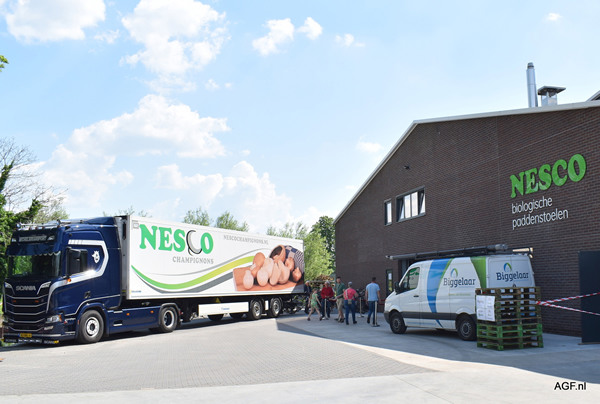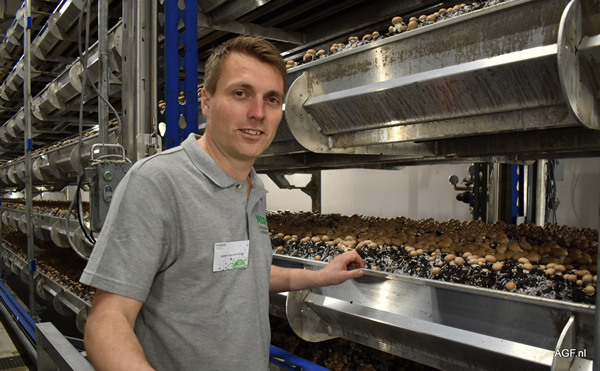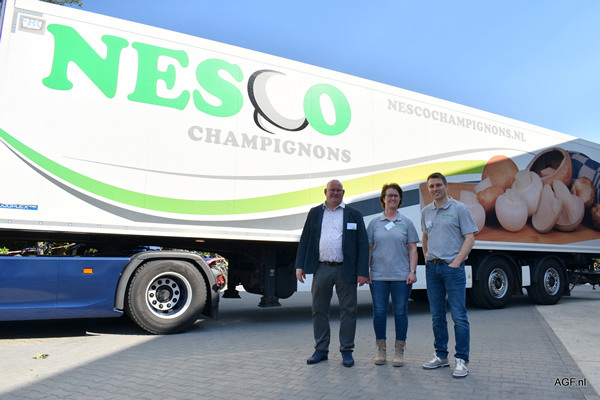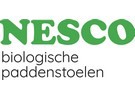On Saturday, the organic mushroom farm Nesco held an open day for invited guests in Sint Oedenrode. This Dutch company completed its new building - which can be called revolutionary - last year. Especially many local residents came to have a look.
Click here to view the photo report.

We spoke to Nesco's owner Jozef van den Elsen, and sales representative Noud Spetgens. This cultivation and trading company focuses on organic mushrooms. It takes its name from the Nusselder, Elsen, and Smits nurseries with the 'co' of Cooperative added. Its main products are white and chestnut mushrooms which it exports and supplies to retailers.
Nesco was created to manage purchasing, sales, and cultivation collectively, separate from other (sales) organizations that could influence the price. "We now grow to order instead of delivering in bulk and just waiting to see what that yields," begins Jozef.
New building after fire
The company's premises burnt to the ground three years ago. That prompted a massive investment in a future-proof new building to be able to produce, at lower costs, as efficiently as possible. They also switched entirely to organic farming. That, too, was challenging because it requires plenty of skill and insight.
So, what is the added value of organic? "That starts with the raw materials," says Noud. "As organic growers, we try to work circularly. We, thus, deliver the Spent Mushroom Substrate back to where we got the organic straw and mostly also work energy and CO2-neutral."

Jozef van den Elsen
Jozef: "Hygiene is paramount in mushroom cultivation. We deal with fungi that are very susceptible to so-called competing fungi. We must work as clean as possible and use as little steam as possible. That uses fossil fuel and increases the CO2 footprint."
"We've managed to achieve a 30-40% energy reduction by using our waste heat. That's realized through heat recovery from our cold rooms' refrigeration compressors. Should we invest in solar panels in the future, that reduction will be even higher," Jozel explains.
At the new location, ingrowth and harvesting are done separately. That prevents diseases and infections. The company has four preparation cells and seven harvesting cells. These 36 m (l) x 6m (h) cells each have 12 beds, so per cell, there's a cultivation area of 615 meters. Labor was reduced by 20% thanks to further automation and using tilting beds. Four people work in the cells, and four in processing.
"We've come a long way with automation," Noud explains. "Currently, we're busy automating the process where the mushrooms leave the conveyor belt and are placed in trays. GTL has already completed a test set-up which looks very promising. Once that's done, we must still tackle the supply and discharge. But that's much easier."
The tilting beds led to more ergonomic, quicker work. Staff can use both hands at once to pick the mushrooms and place them on a conveyor belt. The pickers no longer cut anything; the machine cuts the stalks off further along. The mushrooms are packaged and weighed at a second location, where sales are organized too. There is plenty of innovation and experimentation in the area of packaging.

Noud Spetgens, Teunie Bloem, and Jozef van den Elsen. Co-shareholder Jeroen Smits is absent.
How is the crop kept profitable?
There is much competition in the mushroom world. Is the market big enough? "Yes, it is, but there's still competition. You can make it work, though, with the best compost and the right growers," continues Noud, who expects that, in a few years, only half of the growers within the Netherlands will remain.
"Last year's inflation dealt organic sales a considerable blow. And although people are still budgeting, sales are returning to a reasonable level again. As organic growers, we've raised the price a bit, but not yet the needed 10% of conventional mushrooms. But it's difficult to raise prices in a declining sales market. Fortunately, demand has now stabilized somewhat again."
Considering the white versus specialist mushroom ratio, Nesco sees a shift overseas toward exotic mushrooms. Brown mushroom sales continue well, too, especially in the organic sector. At Nesco, 80% of the trade goes to retailers in North West Europe. "That's quite an important sector for both standard and exotic mushrooms, and retailers put a lot of effort into these products. King oyster mushrooms are very popular, but the rest of the exotics do well, too," Noud says.
How are organic mushroom sales to eateries and in the out-of-home channel developing? "I think only a few restaurants are consciously engaged in organic, and yes, that has to do with pricing."
Last year the cost price was €2+. And that cost - caused by energy and labor - was hard to pass on, the Agriculture and Horticulture Organization of the Netherlands indicated. Growers, therefore, considered stopping. "The Netherlands made a nice jump, selling price-wise, but the rest of Europe is lagging, resulting in both conventional and organic growers not yet achieving what they actually need," Noud concludes.
The new building and working method have strengthened Nesco's competitive edge. They want to further build on that and perhaps apply it to other cultivation companies in the future.
The Sint Oedenrode farm in numbers:
- 120 pallets of mushrooms per week
- 33.000 kilos of mushrooms/week
- 6.765 m2 cultivation area
- 100% organic
Click here to view the photo report.
 For more information:
For more information:
Noud Spetgens
Nesco B.V.
Tel: +31 (0) 857 731 088
Tel: +31 (0) 629 404 559
Email: noud@nescochampignons.nl
Website: www.nescochampignons.nl
